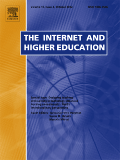
Internet and Higher Education
Scope & Guideline
Unleashing the Potential of Technology in Higher Education
Introduction
Aims and Scopes
- Online Learning Environments:
The journal emphasizes research on online learning environments, including the design, implementation, and effectiveness of various online course formats such as MOOCs, blended learning, and fully online courses. - Student Engagement and Motivation:
A core focus is on understanding factors that influence student engagement and motivation in digital learning contexts, exploring how technology can foster community, interaction, and collaboration among students. - Learning Analytics and Self-Regulation:
The journal highlights studies on learning analytics as a means to enhance self-regulated learning, providing insights into how data can inform teaching practices and improve student outcomes. - Social Presence and Community of Inquiry:
Research pertaining to social presence and the Community of Inquiry framework is central, examining how these elements contribute to meaningful online learning experiences. - Impact of Technology on Learning Outcomes:
The journal investigates the impacts of various technologies on learning outcomes, including the effectiveness of tools like AI, gamification, and social media in educational settings.
Trending and Emerging
- AI and Technology Integration:
There is a rising trend in exploring the integration of AI and other advanced technologies in higher education, particularly in areas like peer feedback and personalized learning experiences. - Microlearning and Bite-sized Learning:
Research on microlearning is gaining traction, emphasizing its effectiveness in enhancing learner satisfaction and engagement, particularly in higher education contexts. - Community and Collaboration in Online Learning:
Studies increasingly focus on the importance of community and collaborative tools, such as collaborative argument mapping and social network analysis, in fostering meaningful interactions among students. - Impact of Online Distraction and Engagement Strategies:
Emerging research examines the effects of distractions, such as smartphone use, on student engagement, and explores strategies to mitigate these challenges in online learning environments. - Diverse Learning Contexts and Student Identities:
There is a growing emphasis on understanding diverse learning contexts and student identities, particularly how these factors influence learning experiences and outcomes in online settings.
Declining or Waning
- Traditional Instructional Methods:
There is a noticeable decrease in research centered on traditional instructional methods, as the focus shifts towards innovative, technology-driven pedagogies that better suit the evolving educational landscape. - Generalized Online Course Design:
Research that broadly addresses online course design without specific technological or pedagogical innovations appears to be waning, as studies now tend to emphasize unique strategies and tools that foster engagement and learning. - Static Assessment Techniques:
The use of static assessment techniques in online learning, such as traditional quizzes and exams, is less frequently addressed, reflecting a shift towards more dynamic, formative assessment practices that support ongoing learning. - Generic Student Support Services:
There is less emphasis on generic student support services, as recent publications focus more on tailored, technology-enhanced support systems that address specific student needs and contexts.
Similar Journals
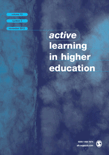
Active Learning in Higher Education
Transforming Higher Education through Active EngagementActive Learning in Higher Education is a premier journal dedicated to exploring innovative and effective pedagogical practices within the realm of higher education. Published by SAGE Publications Inc, this journal boasts an impressive Q1 ranking in the Education category for 2023, positioning it within the top percentile of academic journals in the field, with a Scopus rank of 21 out of 1543, reflecting its high impact and relevance. With coverage spanning from 2000 to 2024, the journal serves as a critical platform for researchers, educators, and students, providing insightful articles that delve into the theories, strategies, and technologies that enhance active learning experiences. While currently not open access, the enriching content is vital for anyone aiming to stay abreast of evolving methodologies and empirical studies in educational practices. Located in the United Kingdom, this journal is committed to advancing the academic discourse surrounding higher education, making it essential reading for those interested in fostering student engagement and learning outcomes.
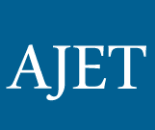
Australasian Journal of Educational Technology
Transforming Tertiary Education with Cutting-Edge ResearchAustralasian Journal of Educational Technology (AJET), a premier peer-reviewed journal published by the Australasian Society for Computers in Learning in Tertiary Education (ASCILITE), has been at the forefront of advancements in educational technology since its inception in 1985. With an impressive Q1 ranking in both Education and E-learning categories for 2023, this open access journal (ISSN: 1449-3098, E-ISSN: 1449-5554) serves as a vital platform for researchers, practitioners, and students aiming to disseminate innovative research and practices in the use of technology for teaching and learning in tertiary education. Based in Australia and accessible to a global audience, AJET is committed to enhancing educational outcomes through the integration of technology, fostering a vibrant community of scholarship and collaboration among educators and industry professionals. With its high impact ranking (Rank #105/1543 in Social Sciences - Education), AJET remains a significant contributor to the scholarly discussion on effective learning environments in an increasingly digital world.

Journal of E-Learning and Knowledge Society
Championing Open Access to Knowledge and LearningJournal of E-Learning and Knowledge Society is a premier academic journal dedicated to the exploration and advancement of e-learning and knowledge dissemination in contemporary society. Published by the SOC ITALIANA E-LEARNING, this journal has established itself as a vital resource for researchers and practitioners since its inception in 2006. With an open access model adopted in 2007, the journal promotes the free exchange of ideas and research findings, ensuring wide accessibility to academic contributions in this rapidly evolving field. The journal is indexed in notable databases and holds a Q3 classification in both Computer Science Applications and Education, reflecting its significant role in the advancement of educational technologies. Furthermore, its Scopus ranks highlight its relevance within the educational and computer science communities. Based in Rome, Italy, the Journal of E-Learning and Knowledge Society aims to bridge the gap between theory and practice, providing a platform for innovative research that shapes the future of digital learning environments. Whether you are a researcher, educator, or student, this journal offers valuable insights and developments in e-learning that are critical to navigating today’s knowledge society.

Advanced Education
Transforming Education with Interdisciplinary InsightsAdvanced Education is a distinguished open-access journal dedicated to the interdisciplinary study of educational methodologies and innovations, published by the National Technical University of Ukraine - Kyiv Polytechnic Institute, Faculty of Linguistics. Since its inception in 2014, the journal has endeavored to disseminate high-quality research findings and theoretical work that contribute to advancements in educational practices and policy-making. With the increasing need for accessible education resources in our rapidly evolving global landscape, Advanced Education plays a critical role in bridging gaps between linguistic studies and educational technology, providing a platform for scholars, educators, and practitioners to share their insights. The journal aspires to enhance educational quality and effectiveness, making it an indispensable resource for researchers, professionals, and students engaged in the field of education.
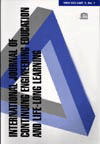
International Journal of Continuing Engineering Education and Life-Long Learning
Advancing Knowledge for Lifelong Engineering Excellence.Welcome to the International Journal of Continuing Engineering Education and Life-Long Learning, a peer-reviewed scholarly journal committed to advancing the discourse in the fields of education, e-learning, and engineering. Published by InderScience Enterprises Ltd in the United Kingdom, this journal serves as a vital resource for researchers, educators, and professionals seeking to explore innovative approaches to lifelong learning and continuing education within engineering disciplines. With an ISSN of 1560-4624 and an E-ISSN of 1741-5055, the journal reflects an ongoing commitment to academic rigor, featuring contributions that span from 1986 to the present. Although classified in the fourth quartile of Scopus rankings in both education and engineering categories, the journal embraces the evolving landscape of technological integration in education, offering a platform for the dissemination of cutting-edge research and practical applications. We invite you to delve into the insightful articles that strive to equip engineering professionals with the knowledge necessary to maintain relevance in an ever-changing world.

RIED-Revista Iberoamericana de Educacion a Distancia
Bridging Gaps in Education Through Open AccessRIED-Revista Iberoamericana de Educacion a Distancia is a premier academic journal dedicated to the dynamic field of distance education, published by the ASOCIACION IBEROAMERICANA EDUCACION SUPERIOR & DISTANCIA - AIESAD. Established in 1998 as an Open Access journal, it provides a valuable platform for researchers, educators, and practitioners to disseminate and access cutting-edge research and innovative practices in distance learning. With its ISSN 1138-2783 and E-ISSN 1390-3306, RIED ranks within the top 2nd Quartile (Q2) in both Computer Science Applications and Education as of 2023, showcasing its significant impact and relevance in academia. Positioned in Spain, the journal not only serves the Ibero-American educational community but also contributes to the global discourse on online education methodologies and technologies. With an impressive Scopus ranking in the 92nd percentile for Social Sciences (Education) and 77th percentile for Computer Science (Computer Science Applications), RIED is essential for those seeking to advance their understanding and expertise in the realm of distance education.

RESEARCH IN HIGHER EDUCATION
Transforming insights into impactful educational strategies.RESEARCH IN HIGHER EDUCATION is a prestigious, peer-reviewed journal published by SPRINGER, focusing on the diverse and dynamic field of higher education research. Established in 1973, this journal serves as an essential platform for academics, practitioners, and policymakers seeking to advance knowledge in higher education effectiveness, student outcomes, and educational policies. With its impressive impact factor and recognition as a Q1 journal in Education, it ranks #332 out of 1543 in the Scopus category, placing it in the 78th percentile among its peers. Although it does not offer open-access options, the journal's extensive research contributions are invaluable to scholars dedicated to understanding and improving higher education systems globally. Recognized for its rigorous scholarship, RESEARCH IN HIGHER EDUCATION plays a critical role in shaping educational practices and policies, making it an indispensable resource for researchers, educators, and students alike.
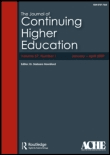
Journal of Continuing Higher Education
Fostering Transformative Educational ExperiencesThe Journal of Continuing Higher Education is a premier publication dedicated to advancing the dialogue around adult learning, professional development, and transformative educational practices in higher education. Published by Routledge Journals, Taylor & Francis Ltd, this journal is recognized for its rigorous research articles and insightful reviews, guiding educators and practitioners in enhancing lifelong learning. With a notable impact factor and a Q2 ranking in Education as of 2023, it plays a pivotal role in shaping policies and practices in the field. The journal embraces a broad scope, encompassing various aspects of continuing higher education from theory to application, and is committed to fostering innovative approaches that respond to the evolving needs of adult learners. Accessible to professionals, researchers, and students alike, the Journal of Continuing Higher Education serves as an invaluable resource for those dedicated to improving educational outcomes for non-traditional students, ensuring that the knowledge shared therein remains relevant and impactful.

Informatics in Education
Championing Open Access to Transformative Educational ResearchInformatics in Education is a premier academic journal published by Vilnius University, Institute of Mathematics and Informatics, focusing on the intersection of information technology and pedagogical innovation. With an ISSN of 1648-5831 and an E-ISSN of 2335-8971, this Open Access journal has been disseminating critical research since 2003, enabling widespread accessibility and collaboration across the global educational community. The journal's commitment to advancing the field is demonstrated by its impressive 2023 Category Quartiles: Q1 in Communication and Education and Q2 in Computer Science Applications, highlighting its significant impact on these disciplines. Located in Lithuania, Informatics in Education ranks impressively in Scopus, with a Social Sciences Communication rank of #54/511 (89th percentile) and a Social Sciences Education rank of #188/1543 (87th percentile). The journal's goals include fostering research that informs pedagogical practices and enhances educational outcomes through the innovative use of technology, ensuring it remains at the forefront of research in this vital field. Researchers, professionals, and students alike will find a wealth of knowledge within its pages to support their work and learning endeavors.
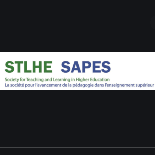
Canadian Journal for the Scholarship of Teaching and Learning
Exploring Evidence-Based Strategies for Effective LearningThe Canadian Journal for the Scholarship of Teaching and Learning (CJSoTL) is a premier open-access journal dedicated to advancing research and discourse in the field of teaching and learning within higher education. Published by SOC TEACHING & LEARNING HIGHER EDUCATION, CJSoTL serves as a vital resource for educators, researchers, and students alike, promoting evidence-based practices and scholarship in higher education pedagogy. Since its inception in 2010, the journal has provided an inclusive platform for innovative research, case studies, and pedagogical strategies that enhance teaching effectiveness and student learning outcomes. Although specific metrics such as H-index and Scopus ranks are currently unlisted, the journal is committed to fostering a community of practice among scholars dedicated to improving teaching and learning environments. With its open-access policy, CJSoTL ensures that valuable knowledge is freely available, aligning with contemporary trends in academic dissemination and accessibility, thus making significant contributions to the scholarship of teaching and learning in Canada and beyond.